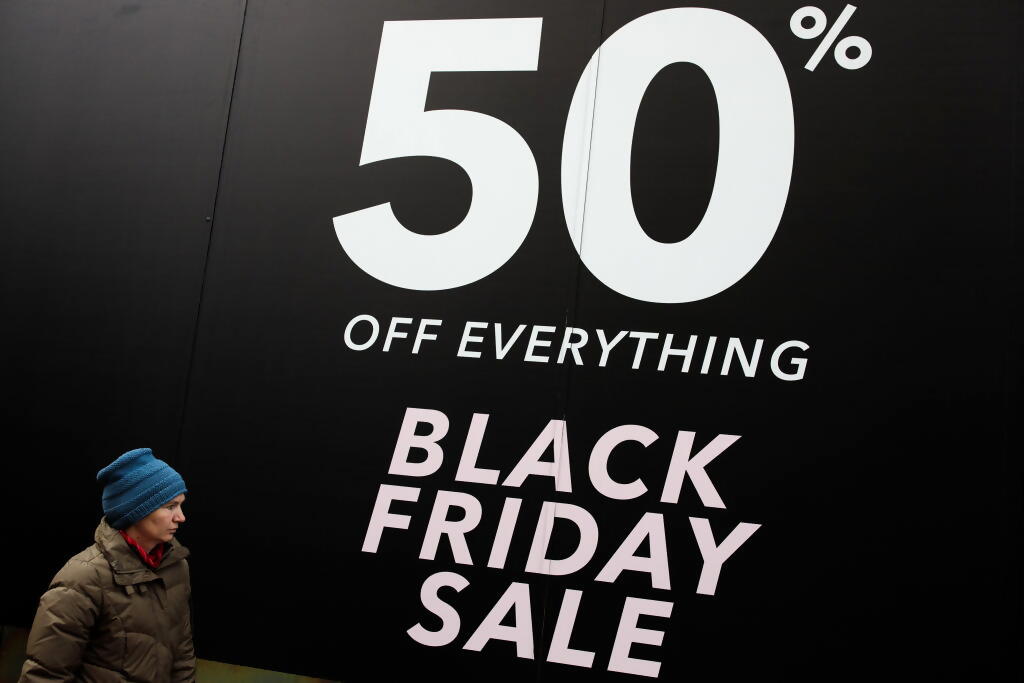
Black Friday cons are nearly as common as deals, but how do you spot if a shop has faked a discount? Mario Laghos pulls the lid open on this new American religion that Britain is beginning to follow.
Black Friday is upon us! This year it will fall on the 25th of November, a day marked by a surge of shopping as consumers rush to snap up early Christmas bargains. Billed as a day of discounts, retailers are pulling out all the stops to tease us across their thresholds. That titillation is expected to pay off as retail experts predict a year-on-year rise in Black Friday shopping of 12.8%. It shouldn’t come as a surprise that the sales event is a draw – as austerity bites, the pressure to fill out the floor space beneath the Christmas tree is on.
So, if the offers were as good as they purport to be, I would resist condemning the festival of consumer culture as yet another piece of our soulless cultural architecture to have trickled down from America. But they aren’t – so I won’t.
Say what you like about hyper-materialism; a deal is a deal. My issue with Black Friday, and its online shopping focussed sequel, Cyber Monday, is that there aren’t any deals to be had. The consumer group Which? analysed over 200 Black Friday offers and found that 98% were either the same price or cheaper at other times throughout the year.
READ MORE: The 9 indie record stores to support instead of Black Friday
Amazon and Very stood out as among the worst culprits, with the latter hiking the price of a Toshiba TV on a Wednesday, in order to slash it on Friday. The consumer group’s retail editor Reena Sewraz said of the event:
“Our research shows that finding a good deal on Black Friday is like looking for a needle in a haystack. It’s rarely the cheapest time to shop, and you’ll probably find the things you want are the same price or cheaper as we head towards Christmas, the New Year and beyond.”

Oxford Street, London: a weary shopper dreams of being anywhere else
But even forearmed with these warnings, it’s hard not to be taken in. Retailers are jostling to snatch every tv spot and smear every billboard with their ‘offers’, promising everything from games consoles to broadband at what they pledge are knockdown prices. Major publications, from the Evening Standard to Forbes, are hosting sponsored links positively shouting about deals you just can’t miss.
The Daily Mail, touting the Oral-B Pro 3500 via Amazon, reported that at £38.95, the toothbrush is “a massive 57 per cent off”. The same item is retailed at Boots for £40 every day of the year – and after a glance at Google, I saw it priced elsewhere at £34.99. Earlier this year, it had been priced as low as £22.95.
DigitalSpy is promoting Sony’s HT-A3000 soundbar as a hundred quid off from Amazon at £499. It’s also £499 from Argos, John Lewis, Richer Sounds, and even at Sony’s own UK store, has been for a while, and is likely to remain so. They also punt the opportunity to save 23% on a 55-inch Sony A80J television for £988, down from its usual price of £1299. Currys couldn’t spare the extra quid and are inviting you to treat yourself to the TV at £999, though they claim the price has come down from £1399. And it has – they put the price up, as they admit in the small print, so that they can fabricate the size of their discount. Under the price, their website reads: Was £1,399.00 (from 28/09/22 to 25/10/22).
Martin Lewis’s Money Saving Expert recommends several valuable tools to track the price history of goods. If you’re tempted to go in for a Black Friday deal, take a moment to check the product out with PriceSpy, PriceRunner, or Google Shopping results.
To give one example, I used PriceSpy to investigate the price of an Xbox Series S. This year, the price has been as low as £169.15 and as high as £239.99. This flies in the face of Amazon’s claims that at £189, you are making a saving of £60.99.
I suspect that young people are savvy enough to dodge the dupes and that these predatory practices are levelled at parents and grandparents. And it’s not just the retailers who have them in their sights on Black Friday; it’s scammers, too. Cyber security experts are warning of a heightened risk of scams over the weekend as fraudsters and thieves look to take full advantage of our vulnerability to the prospect of a bargain.

Apps like PriceRunner and PriceSpy can save shoppers hundreds of pounds
Mike McLellan of Secureworks, speaking to Sky News, warned of fraudulent emails containing fake offers and warns us to check the sender’s domain and address. Chris Bluvshtein of VPNOverview cautioned against falling for fake websites and advised shoppers to look for a padlock on the URL bar signifying the site has a valid security certificate.
READ MORE: Pentiment review | A layered, engaging Medieval game from Obsidian Entertainment
In English parlance, bolting the word ‘Black’ onto the front end of a period of time isn’t a great signifier. There’s Black Wednesday, Black ’47, and Black Friday is no exception. In the American context, the sales event comes hot on the heels of Thanksgiving. After sitting down with family and friends to give thanks for what one has, they burst through shopping mall doors like the supporting cast of Dawn of the Dead to fill the shopping cart-shaped holes in their lives.
We don’t have Thanksgiving in Britain, which makes the entire spectacle even worse. We are like devotees to an American cargo cult, acting out their wildest oddities without context or meaning.
In this regard, Black Friday should be understood as the greatest marketing triumph since General Mills got housewives to buy his cake mix by removing the powdered egg and making it more inconvenient. Like the DFS sale, it’s a fugazi, an elaborate ploy to separate you from your money while convincing you they’re helping you save it. But then, with inflation at 10%, what’s the point in that? So if you are going to empty your pockets this weekend, you probably can’t do better than the Which?-approved Black Friday deals.


